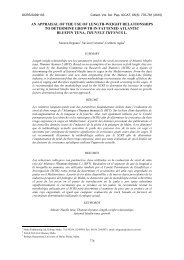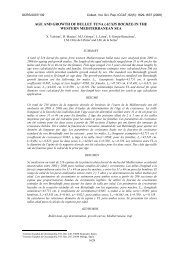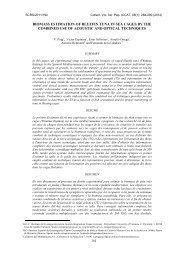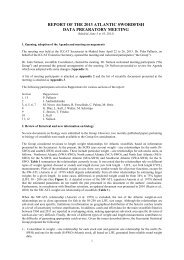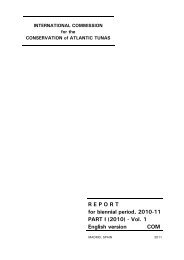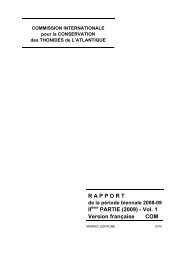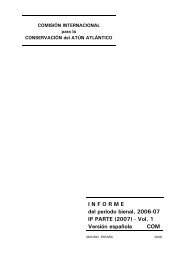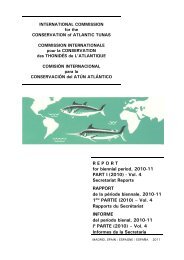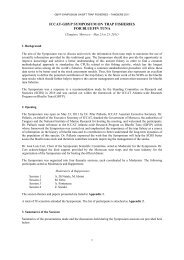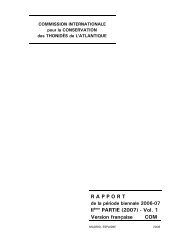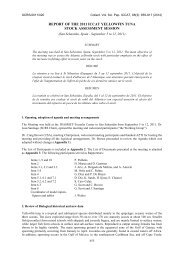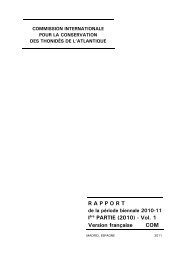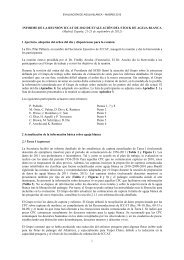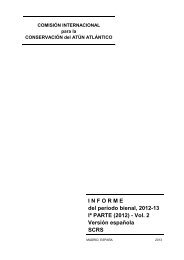E - Iccat
E - Iccat
E - Iccat
You also want an ePaper? Increase the reach of your titles
YUMPU automatically turns print PDFs into web optimized ePapers that Google loves.
ICCAT REPORT 2002-2003 (II)<br />
In discussions of 1.v. on recording and reporting requirements, the Working Group noted that ICCAT has<br />
requirements in place, although not as many as in the outline. The Secretariat reported that the SCRS has already<br />
initiated a process to revamp the Field Manual to include all current ICCAT requirements, but the process could<br />
take a couple of years to complete. The delegations also discussed the pros and cons of moving to more high<br />
tech electronic means of compiling and reporting data. In discussions of the costliness of data collection, the<br />
European Community mentioned a program through the General Fisheries Commission for the Mediterranean<br />
(GFCM) to finance data collection for Mediterranean countries in order to mirror what it is undertaken internally<br />
within the Community.<br />
In discussions of 1.vi concerning vessel monitoring systems (VMS), the Working Group agreed that the vessel<br />
monitoring pilot project needs to be evaluated, but in a technical setting. The ICCAT Chair, Mr. Miyahara, stated<br />
that this should be done both in the fall Data Workshop, and also at the 2003 annual meeting. As the Secretariat<br />
reports, one problem is that very few Contracting Parties and Cooperating non-Contracting Parties, Entities or<br />
Fishing Entities (CPCs) have submitted reports on their VMS programs. Others suggested that while VMS is<br />
good for some purposes, such as monitoring closed areas, it is not well suited for determining what a vessel is<br />
doing. The delegations discussed size requirements for vessels requiring VMS, as well as the level of resolution<br />
required and whether VMS should be required on vessels operating within EEZs as well as the high seas. While<br />
some CPCs have now or will soon have 100% VMS coverage, others will need assistance to put programs in<br />
place. Several delegations mentioned the importance of confidentiality of data. The Working Group agreed that<br />
future discussions over the subject of VMS should include definition of terms.<br />
The delegations discussed 1.vii on follow-up on violations, emphasizing this should fall under flag state duties.<br />
They indicated that prompt follow-up to violations is the key to compliance and deterrence. The importance of<br />
transparency was stressed as was the fact that if some countries do not report their violations then it makes those<br />
who do, look bad. Some emphasized the importance of taking into account national laws and due process since<br />
information cannot be divulged while an investigation is pending.<br />
5.2 Obligations of Contracting Parties and Cooperating non-Contracting Parties, Entities or Fishing Entities<br />
The Working Group mentioned that these provisions already exist in ICCAT’s existing Recommendations and<br />
Resolutions. Data reporting will be addressed at the Data Workshop to be held after the SCRS meeting. It was<br />
agreed that data collection is extremely important and ICCAT must improve reporting compliance. Although the<br />
possibility of inter-sessional PWG or Compliance Committee meetings was mentioned at the 2002 annual<br />
meeting, this idea was not agreed upon as it was too difficult for many CPCs to attend. The Working Group<br />
stressed the need for productive and efficient work of the Compliance Committee during the 2003 annual<br />
meeting and recommended adoption of more specific rules and procedures this fall to help facilitate the work of<br />
that body.<br />
5.3 Compliance and enforcement<br />
The Delegate of Japan introduced a document Comments by the Japanese delegation on the EC proposal for<br />
ICCAT Control and Enforcement Scheme (attached as Appendix 4.2 to ANNEX 4.1). This document presented<br />
two types of boarding and inspection: (1) routine boarding and inspection on an at-random basis, and (2)<br />
boarding and inspection based on suspected serious violations. In discussions of this document, the parties<br />
exchanged views on a number of issues, including reciprocity, equity, differences in national laws regarding<br />
third Party boarding and special needs of developing countries. Some delegations suggested that other types of<br />
monitoring, such as VMS, port inspection or observer programs could be more effective than third party<br />
boarding and inspection, given the size of the ICCAT Convention area and the nature of the majority of<br />
ICCAT’s conservation and management measures. They questioned the actual need for a boarding and<br />
inspection program. Others suggested the importance of boarding and inspection as a fundamental part of a<br />
monitoring program to demonstrate ICCAT’s commitment to respect for conservation measures. Some<br />
suggested the importance of moving forward on this issue in a stepwise manner. Some parties questioned the<br />
idea of splitting up boarding activities in the manner suggested by Japan. In particular, it was noted that routine,<br />
random boarding was important as a deterrent. It was also noted that determining what constitutes adequate<br />
suspicion of a serious violation to support boarding would be difficult.<br />
Discussions also touched on the 1995 Agreement For The Implementation of the Provisions of the United<br />
Nations Convention on the Law of the Sea of 10 December 1982 Relating to the Conservation and Management<br />
of Straddling Fish Stocks and Highly Migratory Fish Stocks (U.N. Fish Stocks Agreement) and its sections on<br />
boarding and inspection. Some wanted to be sure that ICCAT did not fall short of standards in the U.N.<br />
76



